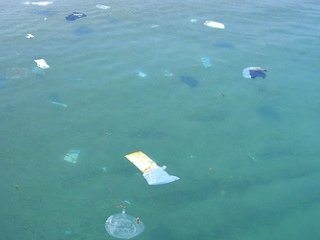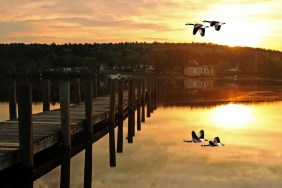 One of the primary reasons so many anglers spend as much time as they can on the lake is the vast, tranquil beauty that nature possesses. Any fisherman will defend that there is nothing like standing waste deep in a secluded, trickling river while your hand-tied fly dances on the water's surface, or sitting in your boat, amidst a veil of fog, as the sun's light peers over the horizon. Crystal clear rivers and lakes, rugged, yet beautiful landscapes, and the chance to observe wildlife that most only read about, are the rewards of taking a day to enjoy the natural magnificence of the outdoors. However, the number of threats against the environment is ever-growing due to man-made influences such as litter, foreign chemicals introduced into fragile ecosystems, and improper treatment of fish. While unfortunate occurrences happen frequently, there are numerous measures that those concerned for the cleanliness of the environment can take in order to preserve our fisheries for future generations.
One of the primary reasons so many anglers spend as much time as they can on the lake is the vast, tranquil beauty that nature possesses. Any fisherman will defend that there is nothing like standing waste deep in a secluded, trickling river while your hand-tied fly dances on the water's surface, or sitting in your boat, amidst a veil of fog, as the sun's light peers over the horizon. Crystal clear rivers and lakes, rugged, yet beautiful landscapes, and the chance to observe wildlife that most only read about, are the rewards of taking a day to enjoy the natural magnificence of the outdoors. However, the number of threats against the environment is ever-growing due to man-made influences such as litter, foreign chemicals introduced into fragile ecosystems, and improper treatment of fish. While unfortunate occurrences happen frequently, there are numerous measures that those concerned for the cleanliness of the environment can take in order to preserve our fisheries for future generations.
Nothing can come as close to ruining a day on the water as seeing trash such as pop cans, plastic bags, and bait containers floating on the surface or stuck in the reeds at the water's edge. Not only do these objects diminish the beauty of nature, but, if left to degrade over time, will add harmful chemicals to the ecosystem. Tangled nests of discarded fishing line are another culprit wreaking havoc on the lakes. Many careless anglers become snagged on a log and simply cut yards upon yards from their line, leaving it in the water for the wildlife to become entangled in or even attempt to ingest. The next time you find your lure snagged or you finish another bottle of water, refrain from simply leaving it in your wake and keep a trash bag handy. Also, it may seem disgusting, but it takes only a brief moment to stop and add such wayward items to your own trash and it goes a long way towards keeping the water clean and free of pollution.
Catching fish is an exciting experience, but in order to ensure that others will be able to share the enjoyment, anglers must take the necessary steps to keep the fish they bring to the boat healthy. It may cost you a fish every now and then, but using a pair of pliers to break the barb on your hooks can reduce the damage and stress they cause fish. The convenience of cleanly freeing a hooked fish cuts down on the risk of further harm to the fish due to lack of water or hook damage as a result of the barb. Also, do what you can to reduce the amount of time a fish remains out of the water. Any fish that is out of the water for a lengthy time should be held by the tail and manually "swam" back and forth slowly in the water at the boat, to ensure that it is healthy and breathing. Additionally, be sure to wet your hands before handling any fish caught. Fish are coated in what some call "slime" but actually is a coating that protects them from harmful bacteria and chemicals. Dry hands and prolonged absence from water strip the fish of this coating and can cause serious health problems, which may have an adverse effect on the local population of that species in your lake.
As tempting as it is, when you catch a large fish, to take it home to your neighborhood pond or private lake, it is not a good idea. You can never be sure of the possible bacteria or illnesses that fish may have and what kind of effects it can have on other fish when introduced to a new body of water. An introduced fish can do severe harm to your local water's ecosystem and potential diseases spread like wildfire to other species. Do the wise thing and take a picture as proof of your catch, and release that lunker so others can catch it in the future.
You can even take action off the water to ensure that your local fisheries remain clean. For example, one of the more obvious acts is taking a moment to cut pop bottle rings before disposing of them. Another way of doing your part, that many may not be aware of, is making sure that, if you wash your car at home, make sure you pull your car onto the lawn and wash it there, instead of the driveway. Not only will the lawn welcome the water, but the grass will break down the soap and absorb any phosphates present and convert them into fertilizer. This practice prevents soapy water from entering storm drains, which undoubtedly make their way to your local river or lake. Also, if you're unable to wash your car on the lawn, you can always make sure to use a commercial car wash, which are regulated to collect and treat their wash water.
For those of you who are interested in going that extra mile in regards to fisheries preservation and environmental cleanliness, there are several organizations that you can contact. The U.S. Fish and Wildlife Service, the World Wildlife Fund, and even your own state's Department of Natural Resources branch all have valuable information on how to do your part, as well as possible clubs and fundraisers in your area where you can take an active role in conservation. All it takes is a conscious mindset to refrain from carelessness and pollution to ensure that the next generation of outdoors enthusiasts will be able to enjoy the beauty of nature that we often take for granted.








